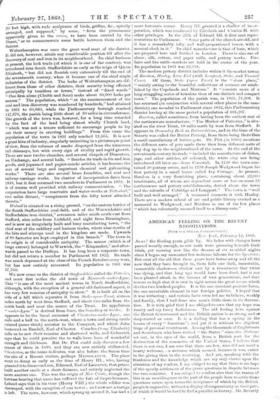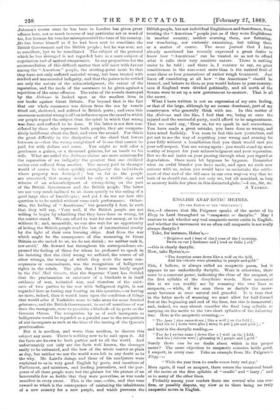AMERICAN FEELING ON THE RECENT
N EGOTIATIONS.
[nom OUR SPECIAG CORRESPONDENT.] Nt //' York, February 12, 1869.
ALAS ! the fleeting years glide by. Six laden with changes have passed wearily enough, as our souls were groaning beneath their trials, yet seeming now like the dreams of six troubled nights since I began my unwonted but welcome labours for the Spectator. But over all the old that these years have borne away and all the new that they have brought in, there fulls one dark, immutable, immovable shadow—a shadow cast by a resentment that twice was dying, and that long ago would have been dead, had it not been planted afresh in the bosoms of two generations, and that towers so high that it is ever in sight across the great ocean which divides two kindred peoples. It is the one constant positive force, the one unvariable element in our foreign politics. I hoped that it was withering ; and certain facts even led me to believe, weakly and fondly, that I had done one man's little share in its destruction. It is with grief that I an obliged to own that my hope was vanity and my fancy foolishness. The old feeling here against the British Government and the British nation is us strong aud as deep-rooted as ever. It is a feeling that has a spriug in tho bosom of every "American'; and yet it is without the slightest tinge of personal resentment. Among the thousands of Englishmen and Scotchmen who have visited " the States " since the ilbsbotaa set out, in the eyes of the world, from a British port for the destruction of the commerce of the United States, I believe that there is not one, I am sure that there are few, who did not meet a hearty welcome, —a welcome which seemed, because it was, easier in the giving than in the receiving. And yet, speaking with the frankness and the knowledge which are my only claims upon the attention of my readers, I aiu obliged to say that there is no hope of the speedy settlement of the grave questions in dispute between the two countries. I am obliged to confess also that the reason of this is an unwillingness on the part of the people here to settle those questions unless upon terms the acceptance of which by the British people is impossible, without a display of magnanimity on their part, of which it would be hard to find a parallel in history. Mr. Reverdy Johnson's course since he has been in London has given great j offence here, not so much because of any particular act or word of his, but because his tone has misrepresented the tone of his country. He has borne himself as if he had been sent to conciliate the British Government and the British people ; but he was sent, not to conciliate, but to be conciliated. The subject of the protocol which he has arranged is not regarded here as a mere subject of negotiation and of mutual compromise. In any proposition for the accommodation of this difficult matter that will meet with favour among the " American" people, the starting-point must be that they have not only suffered material wrong, but been treated with studied and unconcealed indignity, and that the points to be settled are only the nature of the acknowledgment, the extent of the reparation, and the mode of the assurance to be given against a repetition of the same offences. The value of the vessels destroyed by the Alabama is looked upon as the smallest item in our books against Great Britain. Far beyond that is the fact that our whole commerce was driven from the sea by vessels fitted out, sheltered, and refitted in British ports ; and even this enormous material wrong is of less influence upon the mood in which our people regard the subject than the spirit in which that wrong was done, and suffered to be done. If the latter is not first considered by those who represent both peoples, they are comparatively indifferent about the first, and even the second. For this is the great difficulty in the dissipation of the cloud that lowers between us—that the wrong complained of is one that cannot be paid for with dollars and cents. You might as well offer a gentleman a guinea, or a thousand guineas, for an insult to his wife. What are called the Alabama claims are mere occasions for the reparation of an indignity the greatest that one civilized nation ever suffered from another. The money paid in damages would of course be taken quickly enough,—by the individuals whose property was destroyed ; but as far as the people are concerned, that money would be only a visible sign and witness of an acknowledgment of wrong-doing on the part of the British Government and the British people. The latter are not very much inclined to sit down quietly to the eating of a good large slice of humble-pie ; and yet I do not see how this question is to be settled without some such performance. Otherwise, the feeling of " Americans," too generally I fear, is such that they will say, Very well, if the British people are not willing to begin by admitting that they have done us wrong, let the matter stand. We can afford to wait for our money, or to do without it ; and, meanwhile, we can also wait for an opportunity of letting the British people read the law of international comity by the light of their own burning ships. And from the war which might be the consequence of this measuring to Great Britain as she meted to us, we do not shrink ; we neither seek it, nor avoid.' Mr. Seward has throughout his correspondence expressed the feeling of those for whom he professed to speak in his insisting that the chief wrong we suffered, the source of all other wrongs, the wrong of which they were the mere consequences or concomitants, was the recognition of belligerent rights in the rebels. The plea that I have seen lately urged in the Pall Mall Gazette, that the Supreme Court has decided that the proclamation or existence of a blockade is in itself evidence of war, technical war, and therefore of the existence of two parties to the war with belligerent rights, is not regarded here as having any bearing on this question,—as having no more, indeed, than it would have upon the condition of things that would arise if Yorkshire were to take arms for some fancied grievance, and the British Government, to cut off munitions of war from the insurgents, were to proclaim a blockade of its ports on the German Ocean. The recognition by us of such insurgents as belligerents would be regarded as a parallel case to the recognition of our insurgents as such at the time of the issuing of the Queen's proclamation.
But it is needless, and worse than needless, to discuss this subject any more. There is nothing new to be said upon it. All the facto are known to both parties and to all the world. And unfortunately not only are the facts well known, the damages easily to be estimated, and the how of the whole matter as plain as day, but neither we nor the world were left in any doubt as to the why. Mr. Laird's doings and those of his coadjutors were explained to us in very good English by peers, and members of Parliament, and ministers, and leading journalists, and the purposes of all these people were but the plainer for the protest of an honourable few so feeble that they were powerless, as was made manifest in every event. This is the case,—this, and that tone toward us which is the consequence of mistaking the inhabitants of a new country for a new people, and which prevents the
British people, but not individual Englishmen and Scotchmen, from treating the " American " people just as if they were Englishmen in another country, neither scorning them, nor flattering, nor wondering, nor curiously examining, but taking them as a matter of course. The same journal that I have already mentioned has recently expressed a great desire to know how " Americans " can be treated so as not to offend what it calls their very sensitive nature. There is nothing easier to be told ; and there is, I venture to say, no great sensitiveness in the case—not more than is the natural fruit of some three or four generations of rather rough treatment. Just leave off considering at all how "the Americans" should be treated, and behave to them as you would behave to your countrymen if England were divided politically, and all north of the Severn were to set up a new government to-morrow. That is all the secret.
What I have written is not an expression of my own feeling, or that of the large, although by no means dominant, part of my countrymen who generally think with me. In this matter of the Alabama and the like, I feel that we, being at once the injured and the successful party, could afford to be magnanimous. That we could say, ' Hear us, for we speak in sad earnestness. You have made a great mistake, you have done us wrong, and have acted foolishly. You seem to feel this now yourselves, and yet not to see the way of requiting your wrong and atoning for your folly without a humiliation that you think would cost you your self-respect. You are wrong again : you would stand up more worthy of respect for your acknowledgment and your reparation. But we do not insist on your passing through what you regard as degradation. Once more let bygones be bygones. Remember what an awful blunder you have made, and open no such new account with us, unless you would have us undertake the settlement of that and of the old ones in our own way—a way that we both of us should rue, and not only we, but all mankind, as long as memory holds her place in this distracted globe.'—I am, Sir, &c.
A YANKEE.



































 Previous page
Previous page